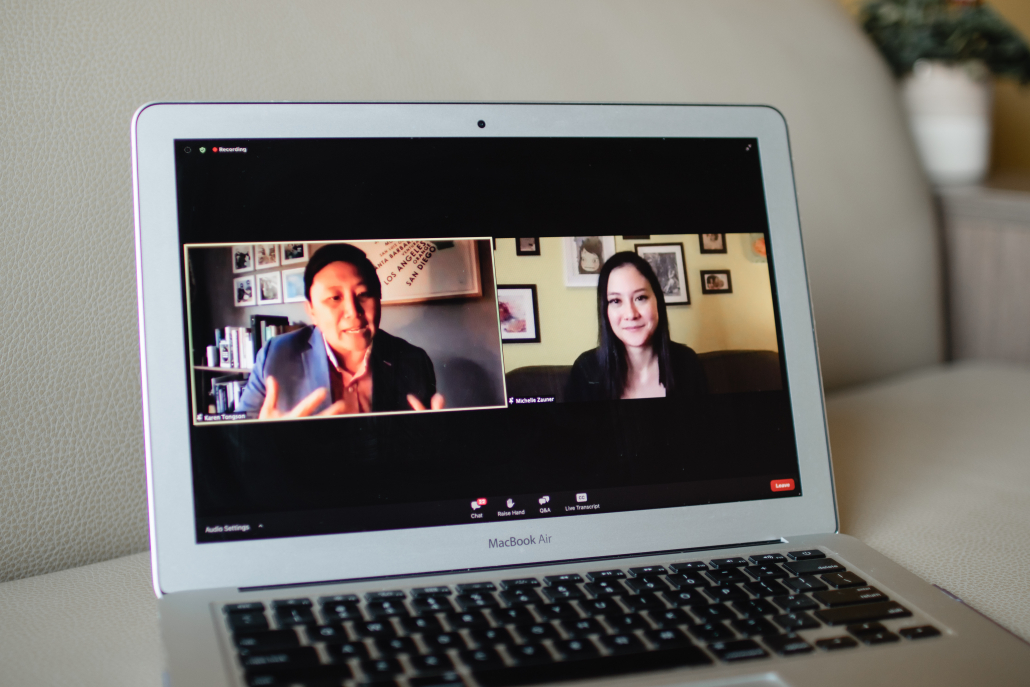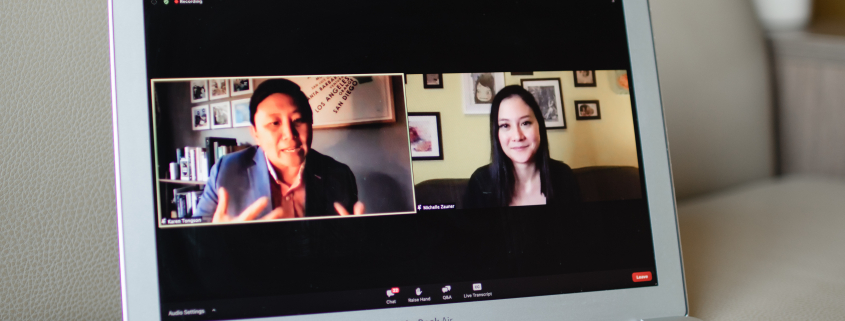Michelle Zauner talks food and culture

The webinar bubbled with excitement as the chat was overrun with messages asking questions and comments discussing the event. (Kellie Chen | Daily Trojan)
Innovative songwriter and author Michelle Zauner joined Professor of English, gender & sexuality studies, and American studies & ethnicity, Karen Tongson in a Zoom webinar Tuesday night hosted by Visions and Voices. Zauner discussed her debut memoir, “Crying in H Mart,” and relayed the lessons she learned as a writer and artist to the USC community.
Published in April 2021, Zauner’s New York Times bestseller “Crying in H Mart” weaves together the grief of losing her mother to cancer as a young adult, the exploration of her biracial identity and her endeavors as an artist all through one universal necessity: food.
Throughout the seminar Zauner emphasized the power of food to heal and strengthen relationships. Zauner explained how making “quiet observations of people’s preferences” about food has taught her how to better love her friends and family members.
Zauner described college as one of several catalysts that helped her realize how food connected her to family. After reading a passage about her mother sending packages of her favorite Korean snacks during her college years, Zauner noted that college was also a time where she began to understand the complexities of her parents’ personalities.
“College, at least for me, [was] the beginning of realizing that my parents were human beings outside of just being my parents,” Zauner said.
Another prominent theme of “Crying in H Mart” is Zauner’s negotiation with her multicultural background being both Korean and white. PhD candidate Samuel Garza had admired Zauner’s work prior to the event and was one of three USC students who had the opportunity to directly ask Zauner a question about how her racial identity influenced her artistic process.
“She talks a lot about her identity in her book, and I feel like being biracial is not a topic that gets addressed a lot,” Garza said. “I’m biracial as well, so to read a book and hear someone talking about their experiences about where they fit in and trying to deepen their connection to their identity really resonated with me.”
Zauner’s “Crying in H Mart” was a New York Times bestseller and is now in the process of being adapted into a film. Despite her accolades, Zauner remains humble, grounding the release of her memoir by discussing her emotions prior to release.
“[I] was so nervous, honestly about the Asian American demographic and how they would read this,” Zauner said.
She continued by explaining her fear that she would be “perpetuating some kind of stereotype unintentionally,” but the reception of her memoir expelled any fears she may have held. The memoir “hit home” for the readers she hoped to resonate with the most such as Garza.
During the event, Zauner read an excerpt from “Crying in H Mart” about her grappling with her identity around other Koreans.
“It was the same way kids at school would look at me before they asked me what I was but from the opposite angle,” Zauner read.
Zauner believes that her efforts to actively engage with the Korean community, such as sharing her art and writing, were essential to being at peace with her identity. Visions and Voices Production Specialist David Delgado felt an event like this was necessary, especially off the heels of USC’s campus reopening.
“We always centralize our programming in connection to students, as well as the intersections of art and equity,” Delgado said. “It seems like the perfect time to present an artist that is outspoken and eager to have dialogues that are about grief, that are about culture and [that are] about loss all through this narrative of art and food.”
Near the conclusion of the forum it was clear that Zauner’s messages about using food to recall notions of culture and family resonated with several participants. Though food cannot always cure homesickness or loss, it can be a way to feel closer to our families and cultures.
Zauner concluded the webinar by discussing her favorite restaurants in Los Angeles, Korean musicians that she admires and, on a more serious note, how she dealt with sharing extraordinarily intimate life events with the public.
“My dad has been a really open book and would have been the first person to say a lot of what is in there,” Zauner said. “[He] was always very open with me about sharing, and I kind of inherited that from him.”
Although the event was virtual, the energy of the attendees was palpable as students engaged in conversation in Zoom’s chat feature.
“[When] we have these discussions like you know what are the experiences of a biracial person, I think that people become more sensitive to the experience of being stuck [at] a door between two worlds,” Garza said. “Hopefully, we can continue to have the conversation to make people feel more accepted for who they are and safe enough to connect with their identity.”

